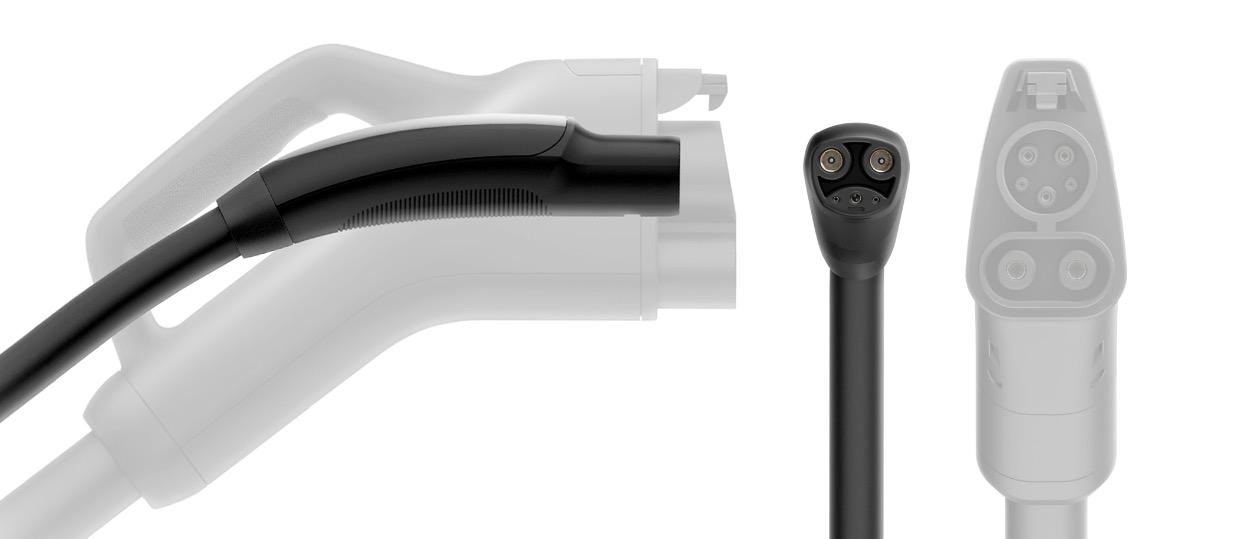
Are we going to get a standards war in the EV space? I doubt it, but things are heating up between Tesla and CharIN, the association leading the CCS standard.
It’s awkward because Tesla is also part of the association.
Last month, Tesla surprised many by announcing that it is opening its EV charge connector with the aim of making it the new standard in North America.
The automaker is challenging the J1772/CCS combo connector, which has been adopted by virtually all other automakers selling vehicles in North America, in the hope that its sleeker and more powerful design will win by force of sheer numbers.
Tesla dominates the EV market in America to such a degree that even though all other automakers currently selling EVs on the market are using the J1772/CCS connector, there are still more EVs in North America using the Tesla connector, now known as the North American Charging Standard (NACS).
The Supercharger network is also undoubtedly the best and most extensive DC fast-charging network in the market.
These are good points for Tesla and NACS, but the automaker still faces an uphill battle to get the connector actually adopted as a standard, and now CharIN is entering the battle.
CharIN, or Charging Interface Initiative, is “an association with nearly 300 international members dedicated to promoting interoperability based on the Combined Charging System (CCS) and the Megawatt Charging System (MCS) as the global standard for charging vehicles of all kinds.”
Tesla, which has adopted CCS in Europe, is a member of the association – that is why it was sort of a surprise that after 10 years of selling cars with its own proprietary connector in North America and recently announcing that it will let non-Tesla CCS EVs on its Supercharger network, Tesla decided to now open its connector as a standard.
CharIN has now issued a statement about Tesla’s move to open the connector, and the association is clearly not happy with its member:
In response to Tesla’s announcement on November 11, 2022, to publicly release the North American Charging Standard (NACS), the Charging Interface Initiative (CharIN e.V.) and its CharIN North America Chapter (operating as CharIN Inc.), would like to issue the following statement. CharIN is the largest global association focused on the electrification of all forms of transportation based on the seamless and interoperable charging experience enabled by the Combined Charging System (CCS) and the Megawatt Charging System (MCS). CCS and MCS are the global standards for charging vehicles of all kinds.
The association started out by congratulating Tesla for using DIN 70121 and ISO 15118-02 communication standards for the NACS and the company’s general contribution to electrification.
But it quickly scolds Tesla for moving away from CCS:
However, we encourage stakeholders to investigate ways to focus on market acceleration rather than the creation of yet another form factor alternative, which will lead to further consumer confusion and delay EV adoption. CCS has gone through many years of rigorous standardization processes, which is a required activity for any new standard proposal. After a decade of collaborative work, the domestic and international EV industry has aligned around CCS.
They added to the statement a list of reasons why the industry is backing CCS (I added some counterpoints in parentheses):
- Nearly 300 domestic and international CharIN members are using or investing in CCS.
- The majority of major domestic and international automakers are using and supporting CCS, including Audi, BMW, Daimler, Ford Motor Company, General Motors, Honda, Hyundai/Kia, Lucid, Lotus, Mazda, MAN, Mercedes-Benz, Navistar, New Flyer, Nikola, Nissan, PSA Groupe, Proterra, Renault, Rivian, Scania, Stellantis, Subaru, Suzuki, Tata Motors, Tesla, Toyota, Volvo, and Volkswagen.
- In the US, CCS is used in over 50 passenger vehicle models. (Yes, but Tesla with NACS outsells all of them combined with 4 models.)
- The Combined Charging System can connect to all AC charging stations without an adapter via the J1772 standard (NACS has the same connector for AC and DC).
- Worldwide, there are 61,000 DC fast chargers using the CCS connector, compared to 40,000 Tesla Super chargers according to data published by CharIN and Tesla. (That includes both CCS 1 and CCS 2, which are different connectors, nor should it be relevant anyway because vehicles rarely move continents.)
- In North America (including the US and Canada), there are 18,880 CCS connectors compared to 18,405 Tesla Super charger connectors and 178,926 J1172 connectors compared to 15,529 Tesla destination connectors, according to recent Plugshare data (includes public and restricted use). (The fact that Tesla almost has deployed as many Superchargers as all other charging networks combined is kind of crazy actually. Also, I’d note that power-wise Tesla is probably higher since many of those CCS stations are capped at 50 kW, and also many of those stations are located at car dealers, which are ideal locations for DC fast-charging.)
CharIN also suggests in its response to Tesla’s NACS that it will have difficulties passing the standard through standard bodies:
At a minimum, the Tesla proposal will have the hurdle of passing through an established standardization process via standards bodies, such as ISO, IEC, and/or SAE.
The association basically ends its statement by asking Tesla to come back into the fold with CharIN and CCS.
Electrek’s Take
I have doubts about Tesla really thinking that it can make it happen at this point. I think Tesla only wants a few automakers to adopt the standard, and Aptera already did, and that will fulfill the requirement for the federal charging infrastructure funding.
If Tesla had tried to do this five years ago and stuck to it until now, it might have worked, but not now.
Even though Tesla still dominates the EV market in North America by a wide margin, and therefore the NACS connector dominates, there are now too many major EV programs for other automakers using CCS in the works to make a change in my opinion.
But again, I think Tesla knows that.